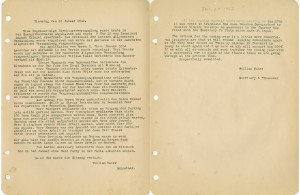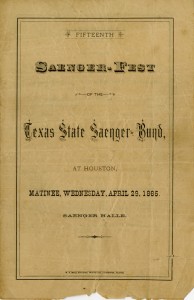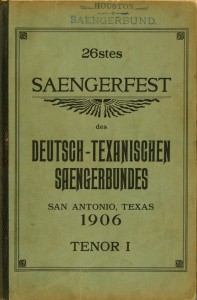
This weekend the Houston Saengerbund Maennerchor will host the 67th annual Texas State Saengerfest in League City. Houston’s oldest music organization will lead this two-day celebration of German music and culture while showcasing new and original music from Rebecca Oswald, R. Michael Daugherty, and Carlie Hunder Burdett.
During the 19th century German immigrants were drawn to Texas, spurred on by a number of factors. Early settlers like Johann Friedrich Ernst (or Friedrich Diercks) sought independence and economic opportunity. Ernst’s letters home championed the cheap and readily available land through Empresario Austin, the mild winters, and the wide-open landscape teeming with game and natural resources. These letters were published in Germany and they spurred on a wave of wide-eyed optimists ready to make their new lives. Later, a number of colonization programs would try to capitalize on this popularity with Germans and ramped up immigration into Texas. By the 1890s rural German enclaves peppered across the Texas landscape while significant percentages of the population had been established in San Antonio, Galveston, and Houston, creating a virtual German Belt.

Houston Saengerbund meeting minutes reflecting the shift in name and language from German to English as the U.S. enters WWII
This German influx led to the establishment of a number of singing societies, not only in Texas but around the country, embracing the old Germanic culture of the Saengerfest. Those longing for the Fatherland could return home, if only in song, for those few happy hours of meeting and celebration. However, during the first half of the 20th century, membership numbers would reflect concerns over anti-German sentiment as horrific warfare dominated the European landscape and spilled over into the rest of the world. Shortly after the Japanese bombing of Pearl Harbor, the Houston Saengerbund changed their name to “The Houston Singing Society,” ceased singing German songs, and began using English as their official language of operation (as reflected in the recorded minutes). Following World War II, as tensions subsided, the club restored their official name and purpose — the celebration of German music.
Today, 130 years after its founding, the Houston Saengerbund continues that celebration.
At the University of Houston Special Collections, our Houston Saengerbund Records stand ready to share in that rich history of celebration. The collection contains materials dating back to the society’s inception up to the present day, including records, Saengerfest songbooks, and programs (some as early as the 19th century). Whether you are a vokalist looking to add to your repertoire or you just want a little sampling of the Vaterland, drop by Special Collections and have a look.

